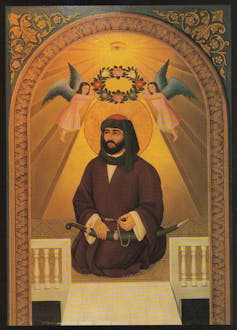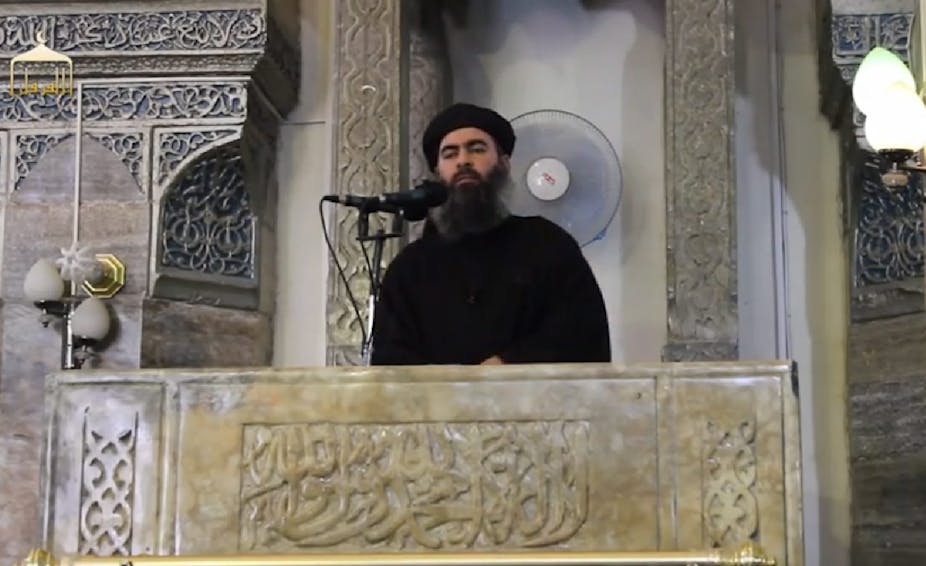According to the Arabic lexicon, khilāfa (caliphate) literally means taking the position of others in order to perform the legal and religious rights behalf on them. It is also used in the meaning of vicegerency and successor in the Qur’an.
In Islam, the Prophet Muhammad is the Seal of the Prophets and no-one can take the place of the Prophet in his position as Messenger of God. However, other Muslims can represent his position as a ruler, for the Qur’an states:
O you who believe! Obey God and obey the Messenger, and those from among you who are invested with authority.
The first ruler for Muslims in Islamic history was the Prophet Muhammad. He became the head of state for a cosmopolite society, which consists of Jews, paganist Arabs and Muslims. However, the Prophet did not state who would be head of state after his death, nor did the Qur’an assign anyone for this job. Choosing a ruler for Muslims is a political issue; therefore it is left to people.
After the death of the Prophet, Muslims of Makkah gathered around Abu Bakr and Muslims of Medina around Sa’d bin Ubada. After long discussions, Abu Bakr was elected as the first ruler of the Muslim population. His title was Khalifatu Rasul al-Allah (Successor of Messenger of God), which can be understood as the ruler who comes after the Prophet.
The first four caliphs, Abu Bakr (632–4), ‘Umar (634–44), 'Uthman (644–56) and 'Ali (656–61) have been called “the rightly guided caliphs” (Khulafa Rashidin) by Sunni Muslims.
The determination of a title for the new leader was difficult, for prophethood would not be used for other Muslims. Therefore, the Muslim community adopted two titles for Muslim rulers after the Prophet: the ruler of believers (amir al-mu’minin) and the deputy of God (Khalifah Allah). From the second term (Khalifah), the English term caliph is derived.
Views diverged on choosing a caliph
Choosing a caliph in the case of the first four personalities (Abu Bakr, 'Umar, 'Uthman and 'Ali) established three different methods: public election, designation by a previous caliph, and assigning a caliph by a council.
In the historical context, two different visions for choosing a leader for the Muslim community emerged: Abu Bakr was the best candidate for caliphate due to his seniority in Islam and being the most respected Companion of the Prophet, according to Sunni scholars. The Shiite claim was that 'Ali was the most suitable candidate for he was the closest relative of the Prophet and was designated as successor by the Prophet.

Because of the political conditions in the Arabian Peninsula, the first four caliphs were chosen from among the Quraysh clan. For the first time in the political history of Islam, the Kharijite sect, who separated from ‘Ali, chose their own caliph. Choosing a caliph from outside the Quraysh bloodline is a controversial issue among Muslim scholars.
There are two views on this matter. According to the first view, any person who has necessary qualifications and knows Islamic principles can be a ruler and a caliph. The Kharijite and Mutazilate sects hold this view. The second group (the majority of Sunni scholars) holds that a caliph must be from the clan of Quraysh.
Ibn Khaldun (1334-1406 CE) holds that the issue of politics and caliphate is related to representing God’s justice among His servants. Therefore whoever is capable of providing justice when ruling Muslims can be elected as a caliph. He argues that, at the beginning of Islam, caliphs were chosen from the bloodline of Quraysh and they all tried to provide justice for all the citizens in the Islamic state. Then it became a kingdom where obeying a caliph was accepted as one of the pillars of the Islamic creed.
Sacred and essential, or baseless and redundant?
The institution of caliphate had been used by various Muslim nations throughout history and it was abolished by the secular Turkish government in 1924.
There are three views among Muslim scholars regarding the caliphate. The first is that the caliphate is a sacred institution – it is universal and necessary for all Muslims. The second is that it is a political institution and was established according to the needs of Muslims. The third view is that there is no such institution in Islam, nor is there a need for it.
Mustafa Sabri Efendi (1869-1954), the last Ottoman Shaykh al-Islam (the head of religious affairs), holds that caliphate is religious and political leadership, and a caliph is a person who represents the Prophet.
Mehmed Seyyid Bey (1873-1925), a member of the Grand National Assembly of Turkey between 1923 and 1925, agreed with Mustafa Sabri on the definition of caliphate but argued that the institution of caliphate came to an end after 'Ali ibn Abī Tālib, the fourth caliph of Islam. He based his argument on a prophetic tradition:
The caliphate will last 30 years, then it will turn into kingdom.
Seyyid Bey believed that the caliphate has a wise purpose but it follows the requirements of the time, therefore it is an issue of administration and politics. He maintained that when the Prophet died, he did not mention anything about caliphate to his Companions, nor is it in the Qur’an.
Contemporary scholar Ali Abd al-Raziq holds that there is no basis for the caliphate in either the Qur’an or in prophetic traditions.
Political revival taps into Muslim longing
However, many Muslims are looking for a just ruler or a caliph who can unite all Muslims and end all the conflicts among them. The conflicts and wars in the Muslim world probably caused them to think about the notion of caliphate.

Many terrorist organisations in history have exploited the desire for the unity of Muslims. For example, in mid-2006, al-Qaeda declared that the Iraqi city of Ramadi was to be the capital of a new Islamic caliphate. In 1953, Taqiuddin al-Nabhani (1909–79), established the Hizb ut-Tahrir (Party of Liberation) to revitalise the institution of caliphate but he could not succeed.
In 1996, Taliban leader Mullah Mohammed Omar announced himself as the Commander of the Believers (Amir al-Mu’minin) and tried to revitalise caliphate in his person. His attempt was recognised by Osama bin-Laden pledging his personal loyalty to him as the legitimate ruler of the state of Afghanistan.
More recently, Islamic State declared a caliphate in an area straddling Iraq and Syria and announced its leader, Abu Bakr al-Baghdadi, as the caliph.
The strong view on a caliphate is that it cannot be revitalised because of the establishment of nation states and the development of ideas of independence. Additionally, the caliphate has lost its effectiveness. Prominent contemporary scholar Fethullah Gulen holds that the revival of the caliphate would be very difficult and that making Muslims accept such a revived caliph would be impossible.
You can read other articles in the Roots of Radicalisation series here.

